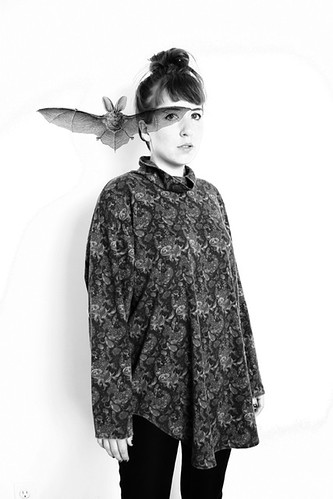On the road promoting Austra’s second album Olympia, singer Katie Stelmanis is glad
to return to the country that gave her ‘summer camp with bands’. “The Laneway
Festival was a fun show,” she says of her 2012 visit. “There aren’t any festivals in the world like it,
except in Australia. Usually you’re just in and out of a place really quickly
so it was very cool to travel with other bands and make friends.”
That world tour saw Stelmanis begin the
partly collaborative process of writing Olympia.
“I don’t actually work that well with other people,” she laughs. “When it comes
to actually coming up with ideas, I come up with them myself then I work with
other people to shape them.”
While still putting her distinctive,
operatic voice front and centre, Stelmanis is currently inspired by the unprocessed
and raw sounds of 1980s house music. Putting her band through a bold reimagining
of the sounds of that era, her sonic ideas dictate the album’s pallet. “I had
just begun to get into dance music at that time and I was influenced by a lot
of producers from the UK. I was really inspired by that sound; before they had
the quantise button and a lot of it was performed live on drum machines, which
doesn’t happen so much anymore. It’s so easy to sound perfect and perfect isn’t
interesting. Electronic music is so easy and accessible, we have to find ways
to factor in the human aspect.” Stelmanis and fellow member Maya Postepski both
have classical training, a background that she believes hinders as much as it
helps.
“So many innovative musicians have no
background in music at all,” she continues freely. “I recall seeing a talk by Brian
Eno where he said that the best musicians are often the ones out of art school
who see music conceptually rather than a technical thing. They’re trying to
find ways to do something different, seeing music as an art, and so many people
with classical training get stuck in their habits and unlearning those was a
very important process for me.”
Having earned critical praise and a sizable
international fanbase with their first album Feel It Break, the band had their choice of potential collaborators
with whom to explore this sound. “For me, it was just about the vocals. I was
obsessed with getting a particular vocal sound,” Stelmanis explains. “With Olympia, we mixed with Tom Elmhirst [Adele
and Amy Winehouse], which was a…contradiction with what we were going for,” she
laughs. “I wanted my voice to sound like Adele’s. On previous recordings, it sounded
strangled; he mixes the biggest female voices and they all sound amazing. I led
that Idea,” she reflects thoughtfully. “I don’t know if Maya would have chosen him,
but for me it was all about my voice.”
Translating this live has presented a
series of challenges that Stelmanis has countered with imaginative programming and
instrumentation, and a smaller band. “We tour so much that we constantly find
new ways of playing live. It’s a weird process. Most times with bands you’ll
write lots of songs in the studio then you’ll start to play them live and you
think ‘oh man I wish I had a chance to put it down on record’,” she laughs. “That’s
true for us.”

No comments:
Post a Comment